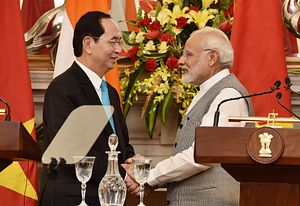India and Vietnam have, in a high-level joint statement, once again affirmed their support for freedom of navigation in the South China Sea, where Vietnam is a claimant along with five other states—China, the Philippines, Brunei, Malaysia, and Taiwan.
In the statement, Indian Prime Minister Narendra Modi and Vietnamese President Tran Đại Quang “reiterated the importance of achieving a peaceful and prosperous Indo-Pacific region where sovereignty and international law, freedom of navigation and overflight, sustainable development and a free, fair and open trade and investment system are respected.”
Also in the statement, the two leaders expressed support for international law in the Indo-Pacific region, specifically mentioning the 1982 United Nations Convention on the Law of the Sea. They called for “the implementation of international legal obligations in good faith, the maintenance of freedom of navigation and over-flight in the South China Sea.”
The declaration was made in a joint statement released on Saturday, during the Vietnamese president’s official visit to India. The Vietnamese president met his Indian counterpart Ram Nath Kovind as well as the Indian prime minister. He also held meetings with the speaker of the lower house of the Indian parliament, Sumitra Mahajan, and also met Indian External Affairs Minister Sushma Swaraj.
India and Vietnam have long converged strategically around a growing list of mutual interests. In particular, both Hanoi and New Delhi have concerns about Chinese behavior in the South China Sea. Chinese claims in the South China Sea, in the Paracel and Spratly groups, overlap with Vietnamese claims. Hanoi has been particularly forward-leaning on the disputes in recent years; in addition to approaching India, Vietnam has grown closer to the United States as well.
In fact, on Monday, for the first time since the end of the Vietnam War, a U.S. aircraft carrier, USS Carl Vinson, will anchor at Danang port, symbolically underlining the growing maritime cooperation between the two countries.
India, too, has grown more concerned about Chinese behavior in the region in recent years. New Delhi has concerns over China’s Belt and Road Initiative, which includes the China-Pakistan Economic Corridor, parts of which transit territory claimed by Indian in Kashmir.
In recent weeks, however, India has pursued a bilateral “reset” of sorts with Beijing. Last year, relations between the two countries were badly strained by a standoff in the Himalayas over Doklam, a piece of territory claimed by China and Bhutan, India’s close partner.

































